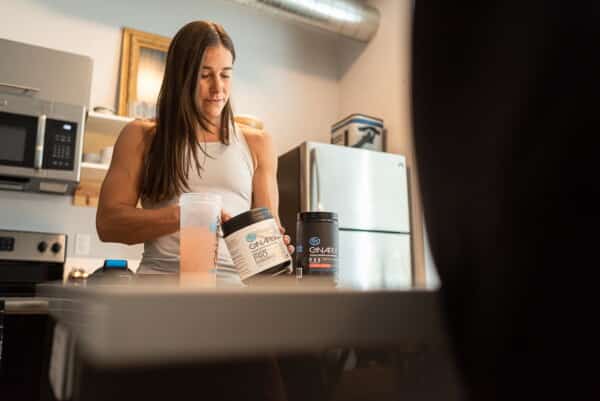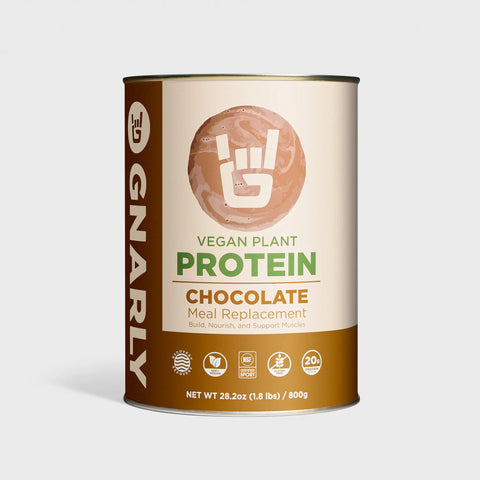Benefits of protein for the endurance athlete
What’s the buzz about protein? First of all, we are made of it, literally. Everything from our muscles, bones, neurotransmitters, and hormones, to tiny microscopic cellular machines, are made up of protein.
Protein benefits:
- Helps with muscle repair
- Helps with muscle building
- Helps maintain fluid balance
- Makes up (almost) all of our enzymes, which helps with metabolism and digestion
- Helps regulate our pH (acid/base) balance
- Boosts immune system health.
Protein aids recovery
If you’re an endurance athlete you probably understand that carbohydrates and fat operate as our primary fuel sources. Protein isn’t directly used for energy in our body unless we run out of carbs and fat, but it does repair our muscles and helps us adapt to heavy training loads.
Additionally, protein intake can also aid in digestion and distribution of nutrients while also playing an important role in fluid and electrolyte balance. All of these factors combined can lead to faster recovery between hard training days and also improved performance over the course of an entire training season.amcorper mattis, pulvinar dapibus leo.
protein and the immune system
Like hemoglobin in red blood cells, white blood cells (WBC’s) need protein to become functional as they use it to fight infection and disease. Antibodies, which are proteins, are sent out by the WBC’s to fight infection. In a study done in 2014 by Witard et al., two groups of trained cyclists were studied during a 2-week block of high volume, high-intensity training. These groups were formed into; a normal protein diet (1.5g/kg of body weight), and a higher protein diet, (3g/kg of body weight). The normal protein treatment group reported more upper respiratory tract infection symptoms and feelings of being run-down than the high protein group. The high protein group maintained a higher white blood cell function during their training block.
Endurance athletes can run themselves into the ground if they aren’t careful. With the volume and intensity of endurance training, it is paramount that endurance athletes optimize their nutrition. Not consuming enough protein can be a double-edged sword. At worst, a sub-optimal amount of protein can open us up to a weakened immune system, allowing infection and disease to take hold, and at it’s best, low protein intake will yield a poorly recovered body. All of this can lead to more missed training sessions, and not performing well during critical training blocks.
adipiscing elit. Ut elit tellus, luctus nec ullamcorper mattis, pulvinar dapibus leo.
protein won't build mass in isolation

If you’re worried about getting “swoll” from added protein in your daily regimen, don’t. Mass will not occur spontaneously and will not independently make you bulk. If you’re looking to add muscle mass you will need to be in a calorie surplus in addition to strength training for hypertrophy. You will not wake up ripped simply from adding a couple of scoops of Gnarly Whey to your daily regimen.
The type of training you do impacts how dietary protein is used in your body. Protein intake in strength athletes primarily helps with muscle repair and contributes to muscle growth (or getting ‘swoll’), while in addition to stimulating muscle repair, dietary protein in endurance athletes results in the synthesis of more mitochondria and mitochondrial enzymes in working muscle (Daniel R. Moore et al., 2014). These latter two adaptations will have a direct impact on aerobic energy production and therefore endurance performance.
So while many endurance athletes may worry that 1) increasing dietary protein will lead to adding bulk or that 2) prioritizing protein intake is only something strength athletes could benefit from, please realize that both are misconceptions. The benefits of increasing protein intake for the endurance athlete are many and include faster recovery, better general health, and improved performance.
protein recommendations and quality
For endurance athletes who train at moderate to vigorous levels, you need 1.2-2g/kg of body weight in protein to simply meet the demands of your training. This does not define an upper limit, and some athletes may need to add more to their diet.
It’s important for omnivorous and vegan athletes alike to pay attention to the quality and digestibility of the protein they consume. Quality protein is easily digestible and comprised of all 9 essential amino acids. Athletes should additionally choose proteins with high levels of the Branched Chain Amino Acid leucine.

Leucine is the only amino acid that is independently capable of enhancing muscle anabolism or muscle growth (Norton & Wilson, 2009). Aim to get 0.05g/kg body weight of leucine per serving of protein. While there are many high-quality vegan protein options, when compared to animal-derived protein, most plant-based proteins are both harder to digest and lower in specific essential amino acids, including leucine. For this reason, athletes consuming a plant-based diet should aim for higher protein intake and consider a BCAA supplement.
good sources of protein include:
|
Protein Source |
Percent of Protein as Leucine |
Grams of Leucine per Standard Serving |
|
Ground Beef (85:15) |
7.8% |
1.2 |
|
Chicken Breast |
7.5% |
2.0 |
|
Egg (whole – large) |
8.6% |
0.54 |
|
Fish (salmon – wild) |
8.1% |
1.8 |
|
Milk (2%) |
9.5% |
0.77 |
|
Pork Loin |
8.5% |
1.9 |
|
Soy Supplement |
8.4% |
2.1 |
|
Whey Supplement |
10.5% |
2.6 |
|
Casein Supplemenet |
9.2% |
2.3 |
|
Gnarly Vegan Protein Powder |
10.2% |
2.04g |
protein timing

- Since protein is not used as immediate energy, it should only be consumed in small quantities before a workout as it may lead to gut distress.
- Using BCAA’s 15 minutes pre-workout can help facilitate recovery during and after exercise.
- The length of your endurance event will determine how much protein to include in your nutrition. For exercise lasting less than 5-6 hours you won’t likely need to include protein as a major part of your fueling strategy.
- To maximize your training efforts post-workout, opt for a carb to protein ratio of 4:1 to 3:1 within 2 hours of exercise to optimize your anabolic (muscle building) window.
- Omnivore’s should shoot for 20g while vegan’s should consume 25-30g protein post-exercise to help facilitate muscle repair and recovery. Gnarly Whey, and Gnarly Vegan protein powder have optimal ratios of protein when paired with your preferred carbs.
final notes
If you increase your protein for training you won’t wake up ripped, but you will wake up more recovered, and with a better chance at completing your training with fewer, or no missed sessions.
Here’s a recipe for my favorite recovery brunch meal to get you started:
Recovery Brunch: 3:1 carb to protein ratio
Omnivore: 2 eggs, 1 1/2 cup quinoa, cilantro, red onion, sesame seeds, salt & pepper, and some hot sauce for added flavor and sodium to replenish electrolytes.
Vegan: Savory Avocado White Bean Toast *See recipe below*
Ingredients:
1 can of great northern beans
1 large Avocado
1/4 cup chopped red onion
1/4 cup cilantro
1 1/2 tbsp. lime juice
1 Slice Sprouted grain Hemp Bread
Instructions:
Drain and strain white beans and set aside. Chop red onion and slice limes into smaller chunks. Place toast in the toaster. In a large mixing bowl combine all remaining ingredients and mash together with a potato masher, or large mixing spoon. Once mixed thoroughly, place mixture on toast and enjoy! You can store Avocado mash for up to 2 days.

Makes 7 servings
Calories: 195
Fat: 5.7g
Carbs: 29.3
Fiber: 9.5
Protein: 10.2
*I usually have two servings!
Source Links:
(Witard et al., 2014) https://www.ncbi.nlm.nih.gov/pubmed/24120932
(Norton and Wilson, 2009) https://www.ncbi.nlm.nih.gov/pmc/articles/PMC3488566/





